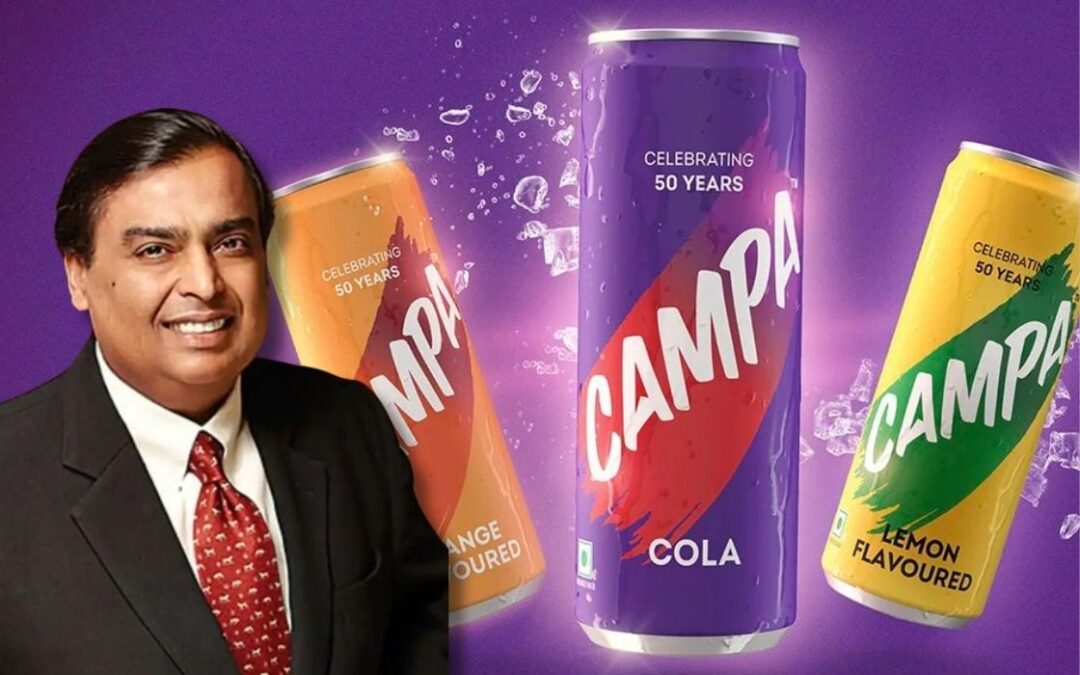India’s beverage industry is undergoing a significant transformation, with Reliance-backed Campa Cola re-emerging as a formidable player in the carbonated drinks segment. The competitive landscape, once dominated almost entirely by Coca-Cola and PepsiCo, is seeing heightened activity as Reliance Consumer Products Ltd (RCPL) pushes aggressively into this market with its pricing strategy, product innovations, and wide distribution expansion.
Origin & Reach of Campa Cola
Campa Cola was originally launched by New Delhi-based Pure Drinks Group in 1977 but lost its presence in the early 1990s when global giants Coca-Cola and Pepsi consolidated their dominance. After its acquisition by Reliance Consumer Products Ltd(RCPL) in 2022 for Rs. 22 crore, the brand has made a strong comeback.
As of March 2025, RCPL highlighted product innovation and strategic acquisitions, including Tagz Foods, and the launch of multiple new variants under Campa, Independence, Alan’s, Enzo, and Ravalgaon.
In a development announced on 18th August, 2025, RCPL has forayed into the fast-growing healthy functional beverage space by acquiring a majority stake in a joint venture with Naturedge Beverages Private Limited.
Through this move, the company aims to introduce a range of herbal-natural beverages, further strengthening its presence as a Total Beverage Company and tapping into the growing demand for healthier, natural alternatives.
By June 2025, the company achieved double-digit market share in several key regions, supported by a robust supply chain and pan-India expansion. Reliance has also set a long-term vision of making RCPL one of India’s largest FMCG companies by 2030.
Origin & Reach of Varun Beverages
Varun Beverages (VBL), incorporated in 1995, is PepsiCo’s key bottling partner in India and across several international territories. The company manufactures, bottles, and distributes popular PepsiCo carbonated drinks such as Pepsi, Mountain Dew, Sting, Seven-Up, and Mirinda, along with non-carbonated beverages including Tropicana juices, Aquafina water, and Gatorade.
VBL holds franchise rights for PepsiCo products across 27 states and 7 union territories in India, covering nearly 90 percent of PepsiCo India’s beverage sales. Internationally, it operates in Nepal, Sri Lanka, Morocco, Zambia, and Zimbabwe.
India remains its largest market, contributing around 80 percent of revenues. The company is also expanding its scope, followed by entering into snacks manufacturing with Kurkure Puffcorn in 2022, Distribution & Sales of Lays, Doritos and Cheetos in Morocco and acquiring PepsiCo’s South African bottler Bevco in 2023 for Rs. 1,320 crore.
Varun Beverages has secured an exclusive PepsiCo snacks franchise to manufacture, distribute, and market the “Simba Munchiez” brand in Zimbabwe and Zambia. The company will invest about USD 7 million (Rs. 60 crore) to set up manufacturing plants with a yearly capacity of 5,000 metric tonnes each. Operations are expected to commence in Zimbabwe from October 1, 2025, and in Zambia from April 1, 2026.
Also read: 1:10 Stock Split: Ethanol stock under ₹100 in focus after setting record date for share split
Assessing Campa’s Threat to Varun Beverages
The central question now is whether Campa poses a real threat to Varun Beverages. According to a report from JM Financial dated 16th March, 2025, the Indian beverage market of approximately 2.4 billion cases is a duopoly with Coca-Cola holding 50–55 percent share and PepsiCo about 30–35 percent, while regional brands account for the remaining 15 percent.
Campa’s re-launch in March 2023 has started to disrupt this structure. RIL, in its Q3FY25 update, indicated that Campa was on track to cross Rs. 10 billion in sales for FY25, translating into 60–70 million cases and a low-single-digit market share.
While this figure is small compared to PepsiCo’s entrenched position, Campa’s aggressive pricing—Rs. 10 for a 200 ml PET bottle and Rs. 20 for a 500 ml bottle, priced at a 30–40 percent discount to Coke and Pepsi has enabled it to quickly capture attention among price-sensitive, mass-end consumers.
Campa’s strategy has been to focus on states such as Tamil Nadu, Andhra Pradesh, Telangana, Uttar Pradesh, and West Bengal, where regional players are already strong, and consumer loyalty is low.
Industry checks suggest Campa is finding traction in smaller SKUs consumed outside the home, though larger SKUs, typically preferred for home consumption, remain dominated by Coca-Cola and Pepsi.
The potential disruption, however, may be higher in adjacent segments like packaged water and soda, where brand loyalty is weaker and price plays a bigger role. Beyond India, RCPL has also launched Campa in Sri Lanka in partnership with Ceylon Cold Stores, signaling its ambitions for overseas expansion.
Conclusion
For Varun Beverages, which relies heavily on PepsiCo’s entrenched portfolio, Campa’s entry represents a credible challenge in specific consumer pockets. However, given VBL’s long-standing relationship with PepsiCo, nationwide reach, diversified beverage portfolio, and international presence, the immediate threat appears contained.
Campa is certainly altering consumer dynamics at the lower-price end of the market, but PepsiCo, through VBL, continues to dominate in larger packs, premium categories, and home-consumption segments.
In summary, Campa is not yet a direct substitute for PepsiCo’s established brands distributed by Varun Beverages, but its aggressive expansion and competitive pricing strategy make it a disruptive force in the Indian beverage industry.
Over time, if Reliance continues its pan-India rollout and product diversification, Campa could pose a stronger challenge to VBL, particularly in the mass consumer segment where affordability dictates buying decisions.
Written By Manan Gangwar
Disclaimer

The views and investment tips expressed by investment experts/broking houses/rating agencies on tradebrains.in are their own, and not that of the website or its management. Investing in equities poses a risk of financial losses. Investors must therefore exercise due caution while investing or trading in stocks. Trade Brains Technologies Private Limited or the author are not liable for any losses caused as a result of the decision based on this article. Please consult your investment advisor before investing.





